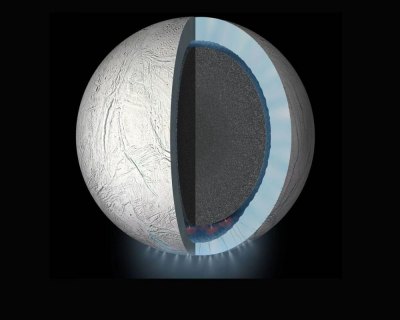Does a Saturn moon host life?

Researchers want to know more about the plumes erupting from the southern pole of Saturn's moon Enceladus.
The Cassina spacecraft will zoom through continuously erupting plumes off Saturn’s moon Enceladus on Oct. 28. The spacecraft cannot specifically detect life, scientists said during a teleconference Oct. 26. But it could offer more information on whether there are conditions that would allow for life forms.
“Enceladus, a tiny, cold, icy moon orbiting Saturn, very distant from the warm sun, has been the source of some of the most amazing and unexpected of our discoveries in the Saturn system,” said Curt Niebur, Cassini program scientist at NASA headquarters in Washington.
The moon, only 310 miles in diameter, has a liquid water ocean under its icy crust, “and we also discovered evidence that there is hydrothermal activity – reaction between the hot rock and the liquid water occurring inside Enceladus at the bottom of that ocean,” Niebur explained. “So Enceladus is not just an ocean world. It is a world that might provide a habitable environment for life as we know it.”
The Cassini, a project of NASA and European space agencies, launched in 1997 and went into orbit around Saturn in 2004. Ever since, the robotic spacecraft has been returning gobsmacking imagery.
The upcoming flyby has scientists excited. The spacecraft will "scream by" the moon's south pole at 19,000 mph, said Earl Maize, Cassini project manager at NASA's Jet Propulsion Laboratory in Pasadena, California. The spacecraft will be just 30 miles above the surface and go right through the plume.
Although the flyby will be over in an instant, it could offer phenomenal views of the plumes, Maize said. With this deeper dive, scientists also expect to sample larger particles and potentially find new organics.
"We can really only detect complex organics," said Linda Spilker, Cassini project scientist at the jet propulsion laboratory. "We don't have the range ... to find anything would [be] like DNA or larger molecules that would indicate life. But we can really do a lot with Cassini to address how habitable is that ocean on Enceladus."
Asked to comment on what complex life forms on Enceladus might be like, Spilker said, "Well if we use an analogy to Earth's oceans and the kinds of life you find near the hydrothermal vents, you could perhaps have a very diverse kind of life there." That might range from individual-cell creatures to more complex life forms.
“Enceladus, a tiny, cold, icy moon orbiting Saturn, very distant from the warm sun, has been the source of some of the most amazing and unexpected of our discoveries in the Saturn system,” said Curt Niebur, Cassini program scientist at NASA headquarters in Washington.
The moon, only 310 miles in diameter, has a liquid water ocean under its icy crust, “and we also discovered evidence that there is hydrothermal activity – reaction between the hot rock and the liquid water occurring inside Enceladus at the bottom of that ocean,” Niebur explained. “So Enceladus is not just an ocean world. It is a world that might provide a habitable environment for life as we know it.”
The Cassini, a project of NASA and European space agencies, launched in 1997 and went into orbit around Saturn in 2004. Ever since, the robotic spacecraft has been returning gobsmacking imagery.
The upcoming flyby has scientists excited. The spacecraft will "scream by" the moon's south pole at 19,000 mph, said Earl Maize, Cassini project manager at NASA's Jet Propulsion Laboratory in Pasadena, California. The spacecraft will be just 30 miles above the surface and go right through the plume.
Although the flyby will be over in an instant, it could offer phenomenal views of the plumes, Maize said. With this deeper dive, scientists also expect to sample larger particles and potentially find new organics.
"We can really only detect complex organics," said Linda Spilker, Cassini project scientist at the jet propulsion laboratory. "We don't have the range ... to find anything would [be] like DNA or larger molecules that would indicate life. But we can really do a lot with Cassini to address how habitable is that ocean on Enceladus."
Asked to comment on what complex life forms on Enceladus might be like, Spilker said, "Well if we use an analogy to Earth's oceans and the kinds of life you find near the hydrothermal vents, you could perhaps have a very diverse kind of life there." That might range from individual-cell creatures to more complex life forms.
Related:
Ocean detected inside Saturn moon
Spacecraft's mission offers new look at Saturn
If you would like to comment, give us a shout, or like us on Facebook and tell us what you think.

